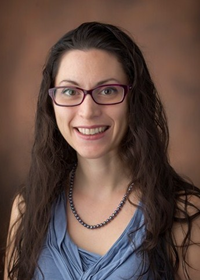
A major emphasis of her work is the genetics of musicality and language traits. See https://www.vumc.org/music-cognition-lab/new-genetics-projects for more information.
Chern A, Tillmann B, Vaughan C, Gordon RL. New evidence of a rhythmic priming effect that enhances grammaticality judgments in children. J Exp Child Psychol [print-electronic]. 2018 Sep; 173: 371-9. PMID: 29778278, PMCID: PMC5986615, PII: S0022-0965(17)30503-9, DOI: 10.1016/j.jecp.2018.04.007, ISSN: 1096-0457.
Wiens N, Gordon RL. The case for treatment fidelity in active music interventions: why and how. Ann. N. Y. Acad. Sci [print-electronic]. 2018 May 5/4/2018; PMID: 29727027, PMCID: PMC6215748, DOI: 10.1111/nyas.13639, ISSN: 1749-6632.
Magne C, Jordan DK, Gordon RL. Speech rhythm sensitivity and musical aptitude: ERPs and individual differences. Brain Lang [print-electronic]. 2016 Feb; 153-154: 13-9. PMID: 26828758, PII: S0093-934X(16)00002-X, DOI: 10.1016/j.bandl.2016.01.001, ISSN: 1090-2155.
Gordon RL, Shivers CM, Wieland EA, Kotz SA, Yoder PJ, Devin McAuley J. Musical rhythm discrimination explains individual differences in grammar skills in children. Dev Sci [print-electronic]. 2015 Jul; 18(4): 635-44. PMID: 25195623, DOI: 10.1111/desc.12230, ISSN: 1467-7687.
Gordon RL, Jacobs MS, Schuele CM, McAuley JD. Perspectives on the rhythm-grammar link and its implications for typical and atypical language development. Ann. N. Y. Acad. Sci. 2015 Mar; 1337: 16-25. PMID: 25773612, PMCID: PMC4794983, DOI: 10.1111/nyas.12683, ISSN: 1749-6632.
Peters SU, Gordon RL, Key AP. Induced gamma oscillations differentiate familiar and novel voices in children with MECP2 duplication and Rett syndromes. J. Child Neurol [print-electronic]. 2015 Feb; 30(2): 145-52. PMID: 24776956, PMCID: PMC4406405, PII: 0883073814530503, DOI: 10.1177/0883073814530503, ISSN: 1708-8283.
Gordon RL, Fehd HM, McCandliss BD. Does Music Training Enhance Literacy Skills? A Meta-Analysis. Front Psychol. 2015; 6: 1777. PMID: 26648880, PMCID: PMC4664655, DOI: 10.3389/fpsyg.2015.01777.
Lense MD, Gordon RL, Key AP, Dykens EM. Neural correlates of cross-modal affective priming by music in Williams syndrome. Soc Cogn Affect Neurosci [print-electronic]. 2014 Apr; 9(4): 529-37. PMID: 23386738, PMCID: PMC3989136, PII: nst017, DOI: 10.1093/scan/nst017, ISSN: 1749-5024.
Unravelling the genetic architecture of musical rhythm. BiorXiv. DOI: https://doi.org/10.1101/836197.
Vanderbilt postdoctoral position: Genetics of language and music traits
The Vanderbilt Music Cognition Lab is recruiting a genetics-focused postdoctoral fellow. The postdoc will develop and carry out grant-funded studies focused on the genetic basis of human rhythm traits and exploring potentially shared architecture with other communication traits (like language), health traits, and related neural endophenotypes. The Lab is a highly interdisciplinary environment that engages trainees from a wide range of Vanderbilt degree programs and maintains collaborations with a network of researchers across Vanderbilt units and with other national and international sites. Training opportunities will be individualized to the fellow’s career goals, drawing from an array of methodologies from human genetics/genomics, music cognition, child language development, communication disorders, and EEG. This position will be co-supervised by Vanderbilt Genetics Institute collaborators (more info here: https://www.vumc.org/music-cognition-lab/new-genetics-projects). The candidate must have strong programming/computational skills, experience working with GWAS data, and an interest in working in a fast-paced biomedical research environment. Compensation will be in accordance NIH scale; initial appointments will be made for one year, with potential to renew for up to 3 years.
Nashville (Music City, USA) is a vibrant cultural and intellectual hub. We are a diverse lab and especially welcome applications from all individuals, including those from underrepresented groups in science; VUMC is an Equal Opportunity and Affirmative Action Employer. Our collaborative relationships on campus also include partnerships with the Vanderbilt Genetics Institute, Vanderbilt Brain Institute, Vanderbilt Kennedy Center, and The Curb Center for Art, Enterprise and Public Policy. Vanderbilt offers exemplary career development for young scientists through the BRET office and other institutional resources, as well as within the lab.
Candidates should send a CV, cover letter, publication reprints, and contact information for three references to Dr. Reyna Gordon reyna.gordon@vanderbilt.edu. Applications will be considered on a rolling basis.
